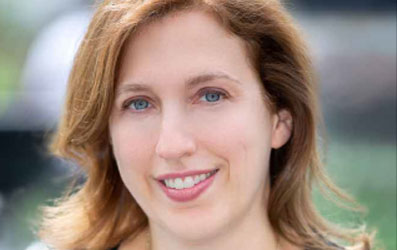Dara Horn, an acclaimed novelist and scholar of Jewish literature, will be the guest speaker at the HERC 2025 Annual Dinner. Her 2021 book, People Love Dead Jews: Reports from a Haunted Present, challenges conventional approaches to Holocaust remembrance and urges educators and institutions to confront the deeper implications of how Jewish suffering is depicted, commodified, and consumed.
Central to Horn’s argument is her insistence that Holocaust education often prioritizes emotions and feelings to produces moralizing lessons over a nuanced and authentic understanding of Jewish life, culture, and history. She questions the portrayal of Jews primarily as passive victims, arguing that this narrative flattens a vibrant, diverse culture and religion into a tragic morality tale. In doing so, she invites a more complex, humanizing pedagogy that centers living Jewish identities rather than symbolic martyrdom. Horn draws attention to the paradoxical reverence for “dead Jews” in a world that remains uncomfortable with living ones. She argues that societies that honor Anne Frank or commemorate Auschwitz often ignore or minimize present-day antisemitism.
Horn’s work calls attention to the problematic way Holocaust memory is frequently separated from contemporary Jewish realities. In her critique of museums, public memorials, and educational curricula, she observes that many institutions highlight the destruction of Jewish communities while omitting the vibrancy of Jewish life before and after the Holocaust. For Horn, effective Holocaust education ought to include not just what was lost, but the enduring traditions, texts, and ideas that have sustained Jewish people for millennia.
Horn’s critical analysis of Holocaust education practices was initially met with a degree of resistance from Holocaust educators and institutions, but in the years since the book’s publication, her perspective has gained traction among educators. Horn presents the concept of time in Jewish thought, which is not linear, but cyclical, like a “spiral, a tangled old telephone cord” of memory. Memory is “less about nostalgia and more about obligation.” The Jewish calendar is structured not to preserve the past as a museum artifact but to reawaken it in the present. Passover, for example, commands every generation to see themselves as personally having been liberated from Egypt. The past is never sealed off as it is part of the present and is about continuity more than closure.
This concept is not merely theological, but political and educational. Jewish tradition does not view time as a straight road from origin to end. Instead, it sees time as a spiral: each year returning us to the same sacred moments, such as Passover, Yom Kippur, Purim, which are not simply commemorations, but as re-livings. The cyclical nature of Jewish time invites history to be understood not as a relic but as perpetual remembrance grounded in temporal consciousness.
For Holocaust education, this means rejecting the view of the Holocaust as “history” in the closed sense and embracing it as part of an ever-unfolding narrative. As the wheel of time turns, we do not move away from the events of the Holocaust, we circle back, again and again, to not only remember it, but to relive it.

